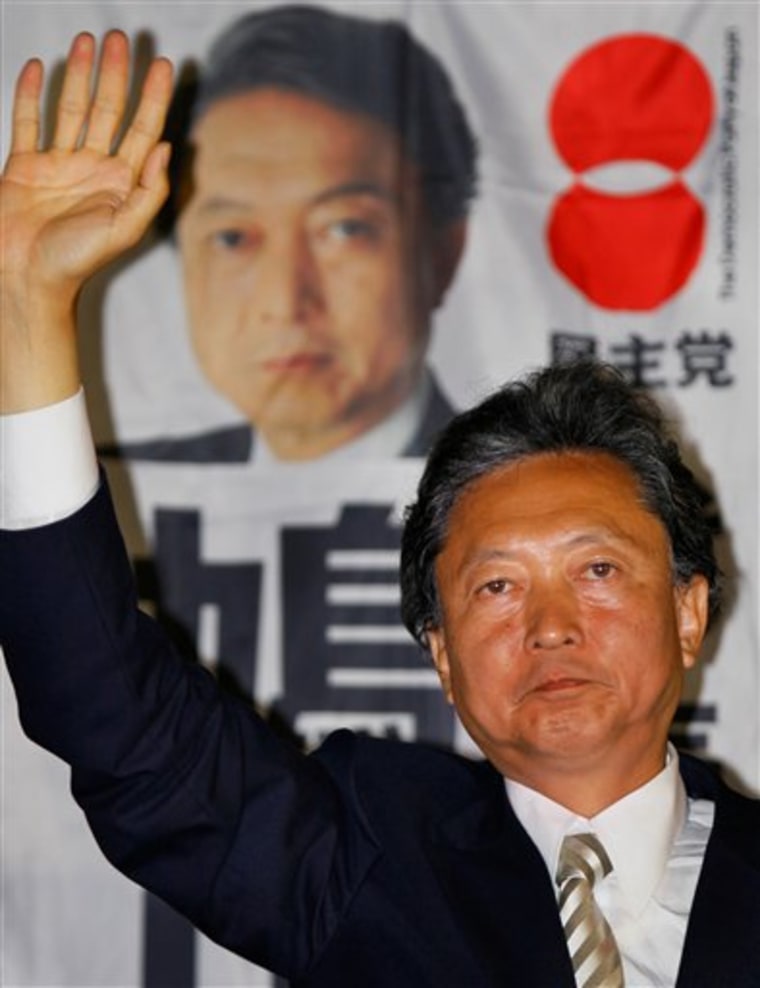A projected resounding victory for Japan's opposition party could cause headaches for the United States as it tries to confront both North Korea's nuclear ambitions and China's increasing military presence in Asia.
The Obama administration will be watching closely how the Democratic Party of Japan will govern should it gain power after Sunday's vote. All major media polls have forecast that the ruling, conservative Liberal Democratic Party will lose badly in balloting for the 480 seats in the powerful lower house of parliament.
Opposition leader Yukio Hatoyama, in line to become prime minister, has pushed for his country to be more independent from Washington and closer to Asia. His party has raised questions about a major realignment of U.S. forces in Japan, close ties with the United States and continuing Japan's refueling mission in the Indian Ocean in support of U.S. forces in Afghanistan.
"As a result of the failure of the Iraq war and the financial crisis, the era of U.S.-led globalism is coming to an end," Hatoyama wrote this past week in The New York Times. But he also predicted that the United States, though declining in influence, "will remain the world's leading military and economic power for the next two to three decades."
Radical change not expected
A DPJ victory is unlikely to destroy the foundation of an alliance forged after Japan's defeat in World War II. Hatoyama has said that he would not seek radical change in Japan's foreign policy, and the U.S.-Japan alliance would "continue to be the cornerstone of Japanese diplomatic policy."
The U.S. is Japan's military protector in a dangerous region, with more than 50,000 troops stationed in the country, and its biggest trading partner. Also, the rhetoric of an opposition party fighting to oust an incumbent from power often changes when that party is faced with the realities of governing.
"It was one thing for the opposition party to take opportunistic partisan shots at the (current Japanese) government for supporting the United States in the war on terror or paying for U.S. bases, but it is quite another to put the alliance at risk when in power," Michael Green, a White House Asia adviser during the George W. Bush administration, said in an interview posted by the Center for Strategic and International Studies think tank, where he is an analyst.
But he said a DPJ victory could cause confusion in Washington and Tokyo "as the DPJ decides what it actually stands for in power." He said the Obama administration and others will, for the time being, be left in the dark about whether the DPJ will "fundamentally realign Japanese politics."
That could create problems for the Obama administration as it deals with China and North Korea.
Bruce Klingner, an Asia specialist at the conservative Heritage Foundation think tank, said in a recent essay that a DPJ victory could throw Japan's security policies into turmoil.
Even the DPJ's own lawmakers, he said, are uncertain about what direction Japan would take should their party win power. Some DPJ conservatives want close military ties with the United States; another faction wants a more independent role for Japanese forces.
Klingner said "the ascendancy of the DPJ may have significant and detrimental effects on the bilateral alliance and U.S. security objectives in Asia."
Support for Japan's governing party has plummeted because of the fragile economy, increasing unemployment, a perceived lack of leadership and its support of higher taxes.
